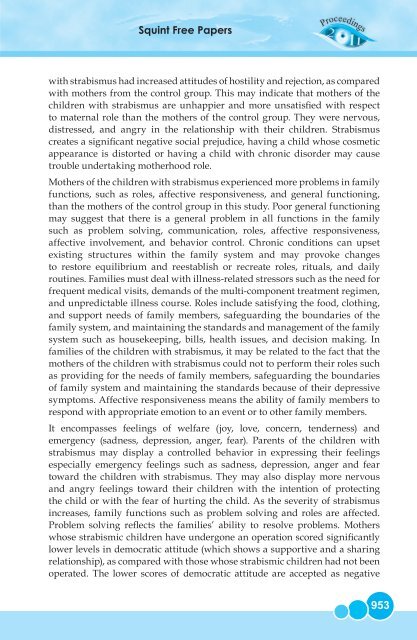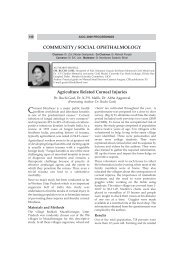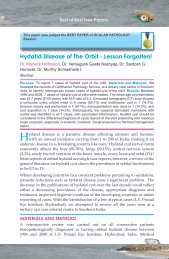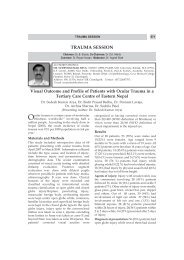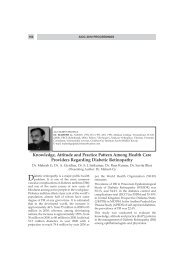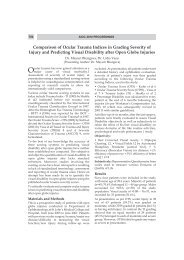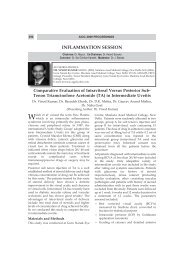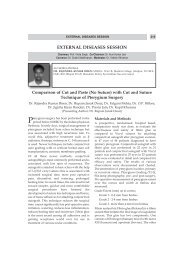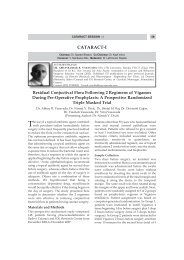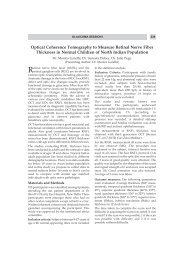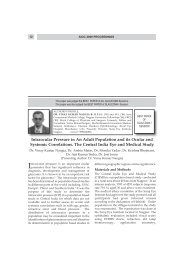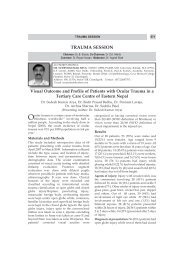Squint Free Papers - aioseducation
Squint Free Papers - aioseducation
Squint Free Papers - aioseducation
You also want an ePaper? Increase the reach of your titles
YUMPU automatically turns print PDFs into web optimized ePapers that Google loves.
<strong>Squint</strong> <strong>Free</strong> <strong>Papers</strong><br />
with strabismus had increased attitudes of hostility and rejection, as compared<br />
with mothers from the control group. This may indicate that mothers of the<br />
children with strabismus are unhappier and more unsatisfied with respect<br />
to maternal role than the mothers of the control group. They were nervous,<br />
distressed, and angry in the relationship with their children. Strabismus<br />
creates a significant negative social prejudice, having a child whose cosmetic<br />
appearance is distorted or having a child with chronic disorder may cause<br />
trouble undertaking motherhood role.<br />
Mothers of the children with strabismus experienced more problems in family<br />
functions, such as roles, affective responsiveness, and general functioning,<br />
than the mothers of the control group in this study. Poor general functioning<br />
may suggest that there is a general problem in all functions in the family<br />
such as problem solving, communication, roles, affective responsiveness,<br />
affective involvement, and behavior control. Chronic conditions can upset<br />
existing structures within the family system and may provoke changes<br />
to restore equilibrium and reestablish or recreate roles, rituals, and daily<br />
routines. Families must deal with illness-related stressors such as the need for<br />
frequent medical visits, demands of the multi-component treatment regimen,<br />
and unpredictable illness course. Roles include satisfying the food, clothing,<br />
and support needs of family members, safeguarding the boundaries of the<br />
family system, and maintaining the standards and management of the family<br />
system such as housekeeping, bills, health issues, and decision making. In<br />
families of the children with strabismus, it may be related to the fact that the<br />
mothers of the children with strabismus could not to perform their roles such<br />
as providing for the needs of family members, safeguarding the boundaries<br />
of family system and maintaining the standards because of their depressive<br />
symptoms. Affective responsiveness means the ability of family members to<br />
respond with appropriate emotion to an event or to other family members.<br />
It encompasses feelings of welfare (joy, love, concern, tenderness) and<br />
emergency (sadness, depression, anger, fear). Parents of the children with<br />
strabismus may display a controlled behavior in expressing their feelings<br />
especially emergency feelings such as sadness, depression, anger and fear<br />
toward the children with strabismus. They may also display more nervous<br />
and angry feelings toward their children with the intention of protecting<br />
the child or with the fear of hurting the child. As the severity of strabismus<br />
increases, family functions such as problem solving and roles are affected.<br />
Problem solving reflects the families’ ability to resolve problems. Mothers<br />
whose strabismic children have undergone an operation scored significantly<br />
lower levels in democratic attitude (which shows a supportive and a sharing<br />
relationship), as compared with those whose strabismic children had not been<br />
operated. The lower scores of democratic attitude are accepted as negative<br />
953


